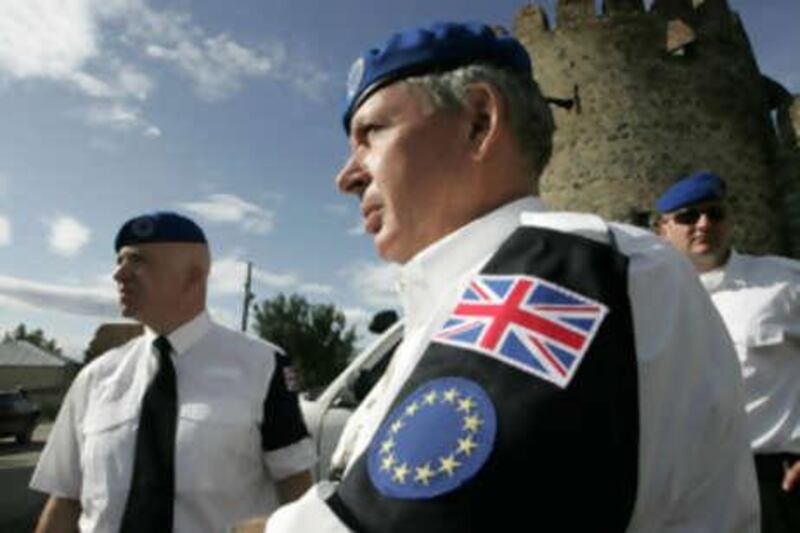GORI, GEORGIA // European Union monitors began patrolling Georgian territory today under a French-brokered peace deal, facing a Russian military that seemed reluctant to retreat. The Russian peacekeeping forces said a day earlier they will not immediately allow any of the 300 EU monitors to enter a buffer zone surrounding the separatist South Ossetia region. The statement raised a fresh concern that Moscow was stalling on compliance with a ceasefire agreement reached after the August war with Georgia.
But when a group of EU observers arrived at a Russian checkpoint near the village of Kvenatkotsa at the perimeter of Russia's so-called "security zone" on Georgian territory, Russians quickly let them enter the area. The Russian soldiers did not allow reporters to follow the observers into the buffer zone, but let Georgian civilians pass after examining their vehicles. "The situation is very calm," Ivan Kukushkin, a Russian officer in charge of the checkpoint said.
Another group of EU monitors also visited the village of Odisi in a different sector just outside South Ossetia. The EU mission head Hansjoerg Haber said the Russian military had earlier warned the EU monitors from entering the buffer zone, citing concerns for their security. "We received different signals," Mr Haber said. "We want to clarify these differences in the coming hours." Russia and Georgia agreed to the EU observer mission as part of an updated ceasefire plan following the war, which ended with Russian and separatist forces in control of the breakaway regions of South Ossetia and Abkhazia.
Russian troops also remained deep inside Georgia for weeks. As part of the deal, Moscow agreed to withdraw its forces completely from territories outside of South Ossetia and Abkhazia within 10 days of the EU monitors' deployment - including from a roughly 7km buffer zone they have created southward from South Ossetia's edge. Russia still plans to keep around 7,600 troops in South Ossetia and Abkhazia, and has refused to allow EU monitors inside the regions themselves.
But the Russian peacekeeping forces' statement said, as of today, the EU monitoring will take place only "up to the southern border of the security zone" pending further consultations. "Show the flag, be friendly, show confidence," Mr Haber told monitors near Lake Basaleti, 20km north of the Georgian capital, Tbilisi. The EU observers will be based in four semi-permanent locations, including the central city of Gori near South Ossetia and the Black Sea port of Poti, key targets of Russian forces.
In Gori, another group of EU monitors boarded their light armoured vehicles to head toward the buffer zone outside South Ossetia. One observer, Adam Glinsky, a 43-year old Polish policeman, downplayed Russia's warning not to enter the buffer zone. "It's only yesterday's opinion, hopefully tomorrow it will be different," he said. The EU foreign policy chief Javier Solana, who visited Georgia yesterday, expressed optimism that Moscow would pull its troops back in the promised time frame.
"I am optimistic that all parties will comply with the agreement that was signed," Mr Solana said. "We hope very much and we are sure that before Oct 10 that part of the mission will be completed." The Georgian president, Mikhail Saakashvili, skirted questions about EU access at a news conference Tuesday. He stressed that Georgia wants a complete Russian withdrawal. "We will not be happy until the last Russian soldier gets out of my country," he told a news conference with Solana.
The war began on Aug 7 when Georgian troops launched an offensive to regain control of South Ossetia. Russia sent troops, which quickly routed the Georgian military and pushed deep into Georgia. Russia's continued occupation of Georgian territory and its subsequent recognition of the independence of Abkhazia and South Ossetia has drawn strong condemnation from the West, which urged Moscow to respect Georgia's sovereignty. * AP






